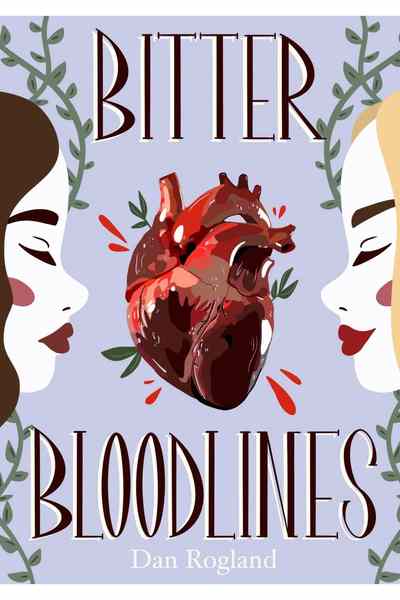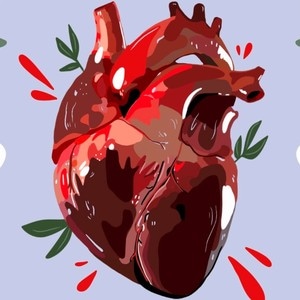My mother had me turned before I was old enough to remember the process. This was, I’ve been told, a great kindness.
I did not meet my family, to my memory, until much later, after I was fully grown. My mother had me ferreted out of the castle while I was still an infant, as soon as the change took place. They tell me the screams from my nursery stopped so suddenly that everyone outside believed I had died. That was the prevailing theory for years, before I returned, though they never found a body, nor held a funeral. Mother would not reveal where I’d gone, and no one could guess that a frightened and grieving queen would have the forethought to create a shield from a newborn daughter.
I was born in the midst of my family’s fall from grace. The sudden death of a king, leaving his untrusted foreign queen pregnant and alone; his only son, my half-brother, still young and sickly, and a bastard of lowly birth. The country was left vulnerable, my mother dependent on an heir to keep the monarchy from falling to the wolves. I arrived, not the needed son, but still a loyal body. My mother saw my potential to be her savior.
When I returned to court, my family rose.
******
I was raised in Raverre, my mother’s home country, across the water from my birthplace in Aveline. The abbey where I was hidden as an infant was on the shores of the channel, overlooking the ocean that separated me from my rightful title. When I grew old enough to train and civilize, I moved inland to live with the Duke of Aegis, an old friend of the monarchy. The Duke saw that I learned reading and writing, politics and history, the geography of the land and the customs of court - everything I needed to be a Princess. His nasferata - my mother’s distant cousin - saw that I learned my more relevant purpose.
Phoenix, the nasferata, taught me to use the skills that my transformation had given me. To track a person by their scent; to cleanly break bones; to defend a vulnerable target against enemies, animals, armored soldiers. He taught me how to kill prey and how to carefully injure, when more diplomacy was needed. How to tell a target from a trap, to sense when a person’s blood was poisoned, to feed without leaving traces on my clothes.
“You will protect your mother, the Queen,” he told me, gravely and often. “By all accounts, you may never need to use these abilities - you will be provided for, and the threat of your presence will often be enough to prevent any attack. But your mother is a foreigner in a land where the people have no love for her, and she will need you, in case her position starts to crumble.”
I would often ask him if I was ready to go to her, and he would smile, pleased with my eagerness.
“When you are bigger,” he would tell me.
I had dreams of her, as a child. There were several large portraits of her at the Duke’s estate - two from her young years in Raverre, and one made in her late teens, just before she left to marry the King of Aveline. She was beautiful: dark hair and dark eyes against sun-kissed golden skin, a softly freckled nose and shy smile. I would dream of her, still eighteen in my mind, surrounded by wild beasts and dark, scheming Avelinian men, trying to tear her off the throne.
Once, after a particular nightmare, I asked Phoenix if he would go and protect her himself, until I was old enough.
“I am Raverian,” he replied. “My presence at court would only put your mother in more danger. The people would accuse her of installing a foreign government. But you - you are an Avelinian nasferata, the daughter of their beloved king. They will have to respect you.”
*****
I was bottle-fed at the abbey, when I was small - fresh blood, still warm, donated by the nuns in turns. I did not require much then, and the ones who cared for me considered it a part of fosterhood. When I moved inland, still a small child, the Duke’s servants would bring me warmed mugs when I needed to feed. I wasn’t told where it came from. I asked my nursemaid, on the first day, if it was hers, and apparently frightened her enough that she had to be replaced, but I hadn’t meant it that way. I just wanted to thank her.
I didn’t ask, after that. Mugs came when I needed them. I had never been particularly interested in the food that the nuns ate at the abbey, but I did develop a curiosity about the food that the Duke and Duchess ate, especially when the servant’s children would swipe pies and candies from the kitchen and run off with them. Eventually I swiped one for myself, and proceeded to vomit blood all over the Dutchess’s linen tablecloth at dinner. I stuck to my mugs after that, and was dismissed from attending meals with others.
When I was nearly eleven, Phoenix taught me to feed properly. He took me to the gate keep, where I had been forbidden to go in the past.
“You are a nasferata and a princess, not some feral strigan,” he said, pulling a set of keys from inside his jacket. “There is no need for a great show of violence and mess. It is possible to feed directly in a way that is civilized.”
He opened the door to a bare, windowless room. The only thing inside was a small wooden table with two chairs and a water basin. Sitting in one of the chairs, slumped over the tabletop, was a stranger.
Phoenix waved me inside with him and shut the door behind us. The man at the table did not stir. He was thin and well-dressed in riding breeches, a collared shirt and vest, although his clothes as well as his boots were wrinkled and dirty. His face was hidden, crooked into his elbow.
“Is he asleep?” I asked.
“He is sedated for you. This keeps the process from becoming an unseemly struggle.”
Phoenix strode over to the man’s side, carefully lifting his limp body by the shoulders and supporting his head as his fingers moved to unbutton the man’s collar. I was struck by how small the stranger looked beside him - weak and soft, positioned with gentle movements, like a porcelain doll. Phoenix, in contrast, moved his muscular frame with the grace and precision of a predator, the confidence of a creature unbothered by threats.
“Here,” he said, pulling the man’s head back to rest on the back of the chair, exposing his soft neck. “Find the cartoid arteries.”
He had taught me this weeks earlier, showed diagrams and told me to memorize the different veins in the body: which ones carried oxygenated blood, where they passed closest to the skin, how long different ones could be drained before a person lost too much blood to survive. I pointed to the location of the arteries on the man’s neck, left and right.
“Very good,” said Phoenix.
“Who is he?” I asked.
“A prisoner.”
“He’s done something wrong?”
Phoenix nodded. “The Duke keeps prisoners who plot against Raverre, foreign spies, intruders. Anyone you feed from here has done something wrong.”
The man stirred. He was not quite asleep, but seemed so tired he could not quite keep his eyes open. Phoenix petted the man’s hair softly, as if to soothe him.
“Go on,” he said, encouraging me. “Just like I showed you.”
I positioned myself behind the prisoner holding his head with one hand, and tentatively sunk my teeth into his neck.
It felt wrong, at first. The man started, a little jolt, and gasped. He was not awake enough to struggle, but it was clear that he felt pain, and it frightened me. I faltered for a second, my lips bloody, slurping messily as I tried to find the vein. I dug my fangs in deeper.
As his vein opened, spilling a hot, steady stream of oxygen-rich blood into my eager mouth, he relaxed, a soft sigh escaping from his lips. I held onto his head as I drank, feeling his muscles soften and droop.
“You see? It hurts them only for a moment. Then your venom calms them.” I felt Phoenix’s hand settle over mine, holding the man’s head up for me. “That’s it. Take it easy, now. You don’t want to kill him.”
******
I wanted Phoenix with me, when I finally sailed back to take my place, but he was true to his word, that he would not go to Aveline and endanger my mother with his presence. Instead, I was escorted by the Duke and Dutchess - Charles and Madeleine - and an unnecessary company of their guards.
“You shouldn’t need them,” I told Charles, as we set out for the ship. “I will protect you during the voyage.”
“Ah, I have no doubt of it, your highness,” he told me. “But who will protect me on the way back home?”
In truth, I had given almost no thought to what might happen after my arrival, and meeting my mother. I had imagined it so many times. When I was young, I would imagine her coming to see me in Raverre: showing up unannounced at the Duke’s estate and throwing back her hood to reveal her beaming face, or stepping out from behind a tree when I was out training on the grounds, revealing that she had been watching me the whole time. Now, two weeks from eighteen, I imagined the splendor of the royal palace in Aveline, my mother’s gleaming crown and outstretched arms as her enemies, my Avelinian cousins, looked on with jealousy.
“It may not be quite the welcome you deserve,” the Dutchess told me, when she found me in my cabin on the ship, agonizing over what to wear. “People will be very curious about their newfound princess, of course, but your mother may wish not to frighten them with a grand display. You will be their first nasferata, after all.”
I remained silent, staring into the mirror as I compared a gold and a silver necklace against my skin. She spoke as if I wasn’t prepared for the change in culture, but of course I had known for years that I might be unwelcome at Avelinian court. Aveline had never adopted the tradition of training nasferata, as Raverre did; the public there was familiar only with strigan, the wild and feral members of my kind, stalking villagers and hunting indiscriminately like some kind of animal.
But certainly I was not, as Madeleine suggested, their first nasferata. I was the first Avelinian one, but Raverian dignitaries had been bringing theirs across the water for centuries. It was customary, in any Raverian noble family, for members outside the line of succession - or very low on it - to be turned and trained, in service to their house. Avelinians may not have adopted the practice, but anyone who frequented court had been exposed to it in their dealings with Raverian diplomats.
“You should wear the red,” the Dutchess said finally, gesturing at the garments I had laid out on my bunk. “It matches your eyes.”











Comments (2)
See all